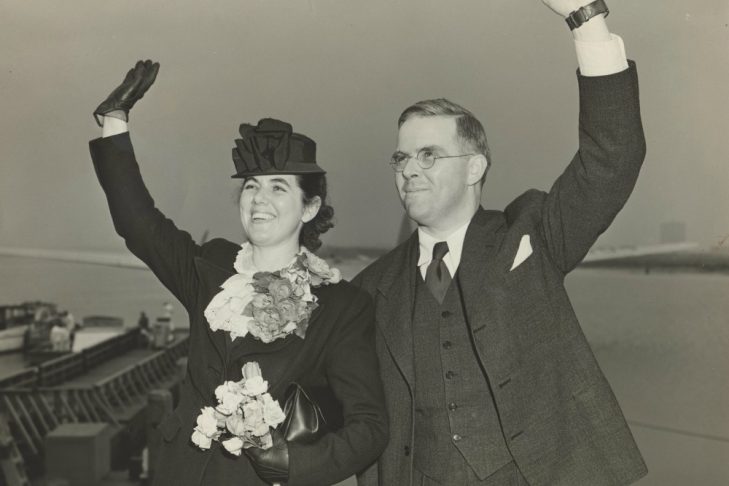It began with a school assignment. Artemis Joukowsky, then a freshman in high school, was assigned to write a report on moral courage with the caveat that the information for the paper had to be gleaned from a personal interview. When Joukowsky casually mentioned the project to his mother, she suggested that he talk to his grandparents about what they did during the second World War. Armed with curiosity and a tape recorder, Joukowsky learned that prior to American involvement in World War II, his grandparents, Martha and Waitstill Sharp, had been involved in several missions in Europe to save Jews and other dissidents from certain death at the hands of the Nazis. That information changed the direction of Joukowsky’s life and became the basis of his new documentary, “Defying the Nazis: The Sharps’ War.”
Co-produced with Ken Burns, the film, which debuts on PBS on Sept. 20, 2016, at 9 p.m., was screened earlier this month at the studios of WGBH. Joukowsky was on hand at the screening, along with Catherine Chvany, who was a child when she was rescued by the Sharps, and Dr. Edna Friedberg, a historian from the United States Holocaust Memorial Museum, one of Joukowsky’s partners in producing the film.
For the Sharps it began with a phone call in January 1939. It was a Sunday evening and they had just returned from church, where Waitstill, a Unitarian minister, had led services. Church leader Everett Baker was on the line, asking if the Sharps would venture from their home in Wellesley and travel to Czechoslovakia to lead an emergency relief mission. The Sharps were the 18th couple that Baker had approached. Sharp, who had preached about the evils of Nazism long before America entered the war, was a natural for the job. His wife, Martha, a trained social worker who once worked at Hull House, a settlement house in Chicago that helped immigrants, shared her husband’s deep sense of social justice.
The Sharps departed for Europe the following month, leaving their two young children in the care of friends. They arrived in a Czechoslovakia that had recently been conquered by the Nazis. During their seven-month stay, the Sharps evaded the Gestapo and Nazi police to save Jewish refugees and Czech intellectuals. They left Prague the day after their offices were ransacked amidst rumors of their impending arrest.
Shortly after they returned to Wellesley, they accepted another mission to go to France, where they rescued Jews, particularly children, and others targeted by the Nazis. Catherine Chvany, a retired professor of Russian literature at MIT, remembers that Martha was instrumental in saving her and her younger sister. “The Sharps,” she said in the panel discussion after the film, “left their own children to take care of other people’s children.” Joukowsky added: “One of the metaphors of this film is what we can do today to help each other. It may not be this extreme. But [my grandparents] knew their kids were safe, were being fed. What they were seeing in Europe was so awful that they couldn’t stop helping people.”
Chvany and her sister lived with a foster family from the Sharps’ parish, who she fondly recalled introduced her to American culture. She was reunited with her parents two years later.
Edna Freiberg noted that “Defying the Nazis” is an apt preview of the Holocaust Memorial Museum’s special exhibition on America and the Holocaust. The exhibition, which opens in two years, will demonstrate that contrary to common perception, “there was a lot of desire to do something [in America], and the exhibit will show that even if there is not a lot of political will, individuals can do something also,” she said. “Aggregate enough individuals and you can get momentum.”
Joukowsky captures the Sharps’ energy and commitment to saving as many people as possible. “I wanted you [the audience] to feel that you were on a journey with my grandparents,” he said. “I wanted them to narrate their own story.” To accomplish that sense of intimacy, Joukowsky moved the story along by liberally quoting the Sharps’ love letters, personal diaries and other documentation. Waitstill’s letters and observations are voiced by Tom Hanks.
The Sharps directly helped over 100 people to escape and had a part in helping over 2,000 people avoid deportation to Nazi death camps. Throughout the war, the Unitarians were also involved in freeing Spanish Republicans from jail. Martha was responsible for saving 75 of those Spaniards by arranging for them to go to Argentina. After the war, she lost a bid for Congress and also aroused the suspicions of the House Un-American Activities Committee.
The Sharps eventually drifted apart and divorced in the 1950s. But Martha continued her activism on behalf of Jews who were persecuted in Iraq and Morocco. In a recent email exchange, Joukowsky noted: “Martha’s Zionism had several roots, in addition to this deeply-rooted love of diversity rather than mere tolerance for people of different backgrounds. She witnessed the effect of the anti-Semitic actions of the puppet Czech government on thousands of Jewish refugees. In France, she lived under the anti-Semitic Vichy government and saw, in visits to four internment camps, the conditions under which people, many of them Jews, were living.”
A decade ago, Yad Vashem, Israel’s Holocaust memorial and museum, named the Sharps as “The Righteous Among the Nations.” They are two of five Americans honored among 25,000 people with the distinction.
This post has been contributed by a third party. The opinions, facts and any media content are presented solely by the author, and JewishBoston assumes no responsibility for them. Want to add your voice to the conversation? Publish your own post here. MORE



